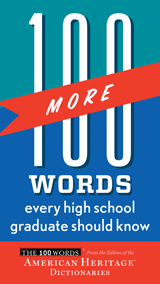
|
|
alacrity amorphous anathema anomie antithesis apotheosis arcanum bathos bellwether bespeak caldera coalesce compunction conflate crepuscular cynosure debunk derivative diaphanous duress efface effulgent eponymous eureka excoriate fastidious feint feral gaffe galvanize gravitas habiliments heterodox hydrocarbon |
impugn inchoate indigenous innate intransigent juggernaut kelvin lacuna lambent lineament Luddite mellifluous miasma munificent nascence neophyte nexus noisome nominal obliquity ontogeny opprobrium ossify oviparous palpable panoply penurious permutation perpetuity perquisite phalanx placebo proximate querulous |
quorum rapacious refractory repudiate risible salient sanctimonious sardonic scurrilous sequester Sisyphean solicitous subsume tenacious travesty triage truculent umbrage unregenerate untenable usury verisimilitude vernacular vertiginous vociferous welter wiki winsome xeric yaw zero-sum zygote |







